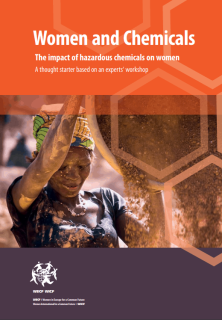
This report summarizes existing information and initiatives on women and chemicals, highlighting the health impacts of hazardous chemical exposure across life stages, sectors and roles. It presents evidence on biological and social factors, specific threats like breast cancer and infertility, and outlines exposure pathways while noting limited but ongoing efforts by international organizations, governments and civil society.
Emphasizing the urgent need for more data and immediate action, the report calls for protecting women from harmful chemicals such as EDCs, POPs, lead, mercury and pesticides. It also offers recommendations to integrate gender into chemical safety policies, improve labelling and awareness and support women as active agents in the sound management of chemicals.
As part of the GEF-funded and UNEP-led “Global Development, Review and Update of NIPs under the Stockholm Convention on POPs” project, the Green Growth Knowledge Partnership (GGKP) is executing Component 4, focused on disseminating information, managing knowledge and coordinating with the Stockholm Convention Secretariat to provide accessible, integrated tools and resources for all Parties.
